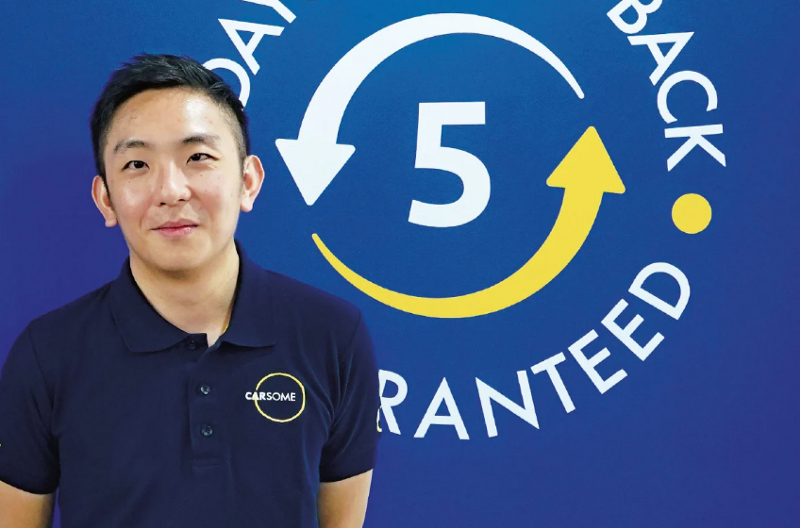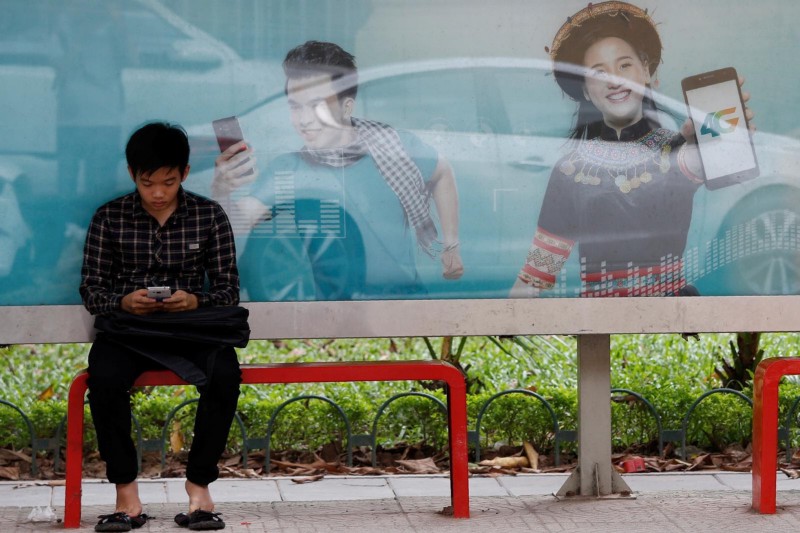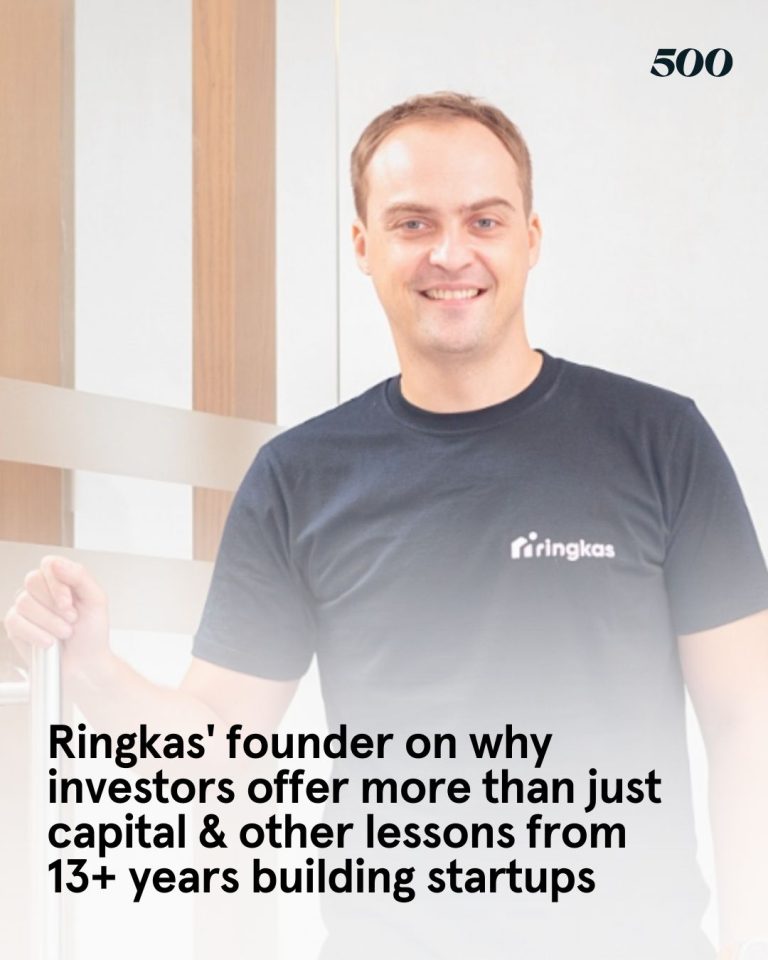Reinventing used-car sales
- 500-backed Carsome, the leading used car trading platform in Southeast Asia, came from humble beginnings.
- The Carsome team started as a tight-knit crew of five. Half a decade later, it now commands a 900-strong workforce.
- Eric told The Edge Malaysia, “Our team [is] spread out across four countries, we even have an office in Beijing!”
- But for Eric, the biggest achievement to date is the recognition and endorsement he’s been receiving from customers.
- “To see satisfying customers using our service, I think that’s a big endorsement to us, recognizing all the efforts we’ve made so far.”

- The company has gone through several key developments even amidst the pandemic. Most significantly, it forayed into the B2C segment with Carsome moving from procuring used cars to selling them on its platform. Carsome’s B2C offers a five-day, no-questions-asked money-back guarantee, on top of a one-year warranty.
- The B2C introduction was also complimented with a new flagship experience center, at which prospective buyers can test-drive vehicles and consult with sales agents.
- It’s all in part to make the experience of buying used cars enjoyable and desirable, Eric added.
- “The whole buying and selling experience has been really traditional and there’s always hassle and headache with purchasing used cars. We wanted to introduce a solution that could tackle all these pain points.”
- After the easing of pandemic-related lockdown measures, Carsome recorded a “V-shaped” recovery once reopening in Malaysia, Singapore, Indonesia, and Thailand.
- Catch Eric on The Edge Markets.
Healthtech spike in Indonesia
- Indonesia’s healthcare system was pushed to its limits during the height of the coronavirus pandemic. Many hospitals across the archipelago were nearing full capacity following a drastic increase in cases.
- The crisis accelerated the need for healthtech, which according to the WHO, is the “application of organized knowledge and skills in the form of devices, medicines, vaccines, procedures, and systems developed to solve a health problem and improve quality of lives.”
- And Indonesians recognized it. Citing Reuters, Tech Wire Asia reported that Indonesia’s local telehealth firms saw usage skyrocket during the pandemic.

- Founders of 500-backed mClinica and Naluri concurred with this emerging trend, with both companies contributing to provide affordable healthcare through their online platforms.
- “Through our work at the pharmacy level, we have been able to reduce the price of medicines to the end patient by up to 60% and reduce stockouts by over 25% on certain critical medicines,” said mClinica founder, Farouk Meralli.
- mClinica counts Indonesia as its largest market, connecting over 170,000 pharmacy professionals from 40,000 regional pharmacies.
- Meanwhile, Azran Osman-Rani, the co-founder and CEO of Naluri, which connects users to its pool of mental health professionals and certified physicians, said they have a 50%-60% success rate of achieving clinically significant health outcomes.
- “For our corporate clients, these quantifiable health improvements translate into more than 5x return-on-investment and a notable direct financial benefit from reduced current and future medical expenses,” he told Tech Wire Asia.
- Beyond the pandemic, Azran and Farouk will aim to bring digital healthcare to the masses.
- “While it is always easier to begin with a more affluent urban segment, to truly serve every person, we are focused on serving all segments. The key for healthtech players is how do you serve everyone regardless of their location or income level?”
Upward trends under lockdown
- A 2020 report from Google, Temasek Holdings, and Bain & Company showed digital services in Southeast Asia surging as lockdown measures kept people at home.
- Five main internet sectors were covered: e-commerce, transport, food delivery, online travel, online media, and financial services.
- The fifth installment of this annual report added new categories that saw growth in the pandemic: health and education technology.
- While businesses and employment have been affected globally, the internet welcomed as many as 40 million new users across the region in 2020.
- This brings the total number of internet users in Southeast Asia to 400 million — or 70% of the population.

- The report predicts the internet sectors could reach USD$100 billion in gross merchandise value (GMV) in 2020 and are on track to hit USD$300 billion in 2025 with the surge in digital adoption seen in these times expected to outlast the pandemic.
- More small-and-medium-sized businesses are also becoming receptive to accepting online payments, pushing digital payments from $600 billion in 2019 to $620 billion in 2020.
- Investments in the health and education technology sectors are growing amid uptake in online health consultations and remote learning.
- Get the full report here.
Missed out the last Daily Markup? Go here to check it out.
You can also find us on LinkedIn, Facebook, Twitter, and Instagram.

500 Startups is a venture capital firm on a mission to discover and back the world’s most talented entrepreneurs, help them create successful companies at scale, and build thriving global ecosystems. In Southeast Asia, 500 Startups invests through the pioneering 500 Southeast Asia family of funds. The 500 Southeast Asia funds have backed over 240 companies across multiple sectors from internet to consumer to deep technology. It continues to connect founders with capital, expertise and powerful regional and global networks to help them succeed.
This post is intended solely for general informational or educational purposes only. 500 Startups Management Company, L.L.C. and its affiliates (collectively “500 Startups”) makes no representation as to the accuracy or information in this post and while reasonable steps have been taken to ensure that the information herein is accurate and up-to-date, no liability can be accepted for any error or omissions. All third party links in this post have not been independently verified by 500 Startups and the inclusion of such links should not be interpreted as an endorsement or confirmation of the content within. Information about portfolio companies’ markets, competitors, performance, and fundraising has been provided by those companies’ founders and has not been independently verified. Under no circumstances should any content in this post be construed as investment, legal, tax or accounting advice by 500 Startups, or an offer to provide any investment advisory service with regard to securities by 500 Startups. No content or information in this post should be construed as an offer to sell or solicitation of interest to purchase any securities advised by 500 Startups. Prospective investors considering an investment into any 500 Startups fund should not consider or construe this content as fund marketing material. The views expressed herein are as at the date of this post and are subject to change without notice. One or more 500 Startups fund may have a financial interest in one or more of the companies discussed.




